高考英语状语从句和动词时态详解及练习
完整版)高中英语状语从句讲解及练习

完整版)高中英语状语从句讲解及练习状语从句是指在句中作状语的从句,可以分为时间、条件、让步、原因、目的、结果、比较、地点、方式状语从句。
时间状语从句的连词有when、as、while、until、not…until、before、after、since、the minute、the moment、each、every、next、the first time等。
时间状语从句一般使用一般现在时或一般过去时。
当使用when、as、while这三个连词引导时间状语从句时,它们都表示“当…的时候”,但侧重点有所不同。
例如,当使用when引导时间状语从句时,从句的主语与主句主语相同,如果谓语动词是be动词,则从句主语和be可以省略。
而as则不仅表示“当…的时候”,还可以表示“一面…一面”或“随着”。
而while则强调主句的动作和从句的动作同时发生,从句一般用进行时,从句动词必须是延续性动词。
当使用until、not…until时,它们表示“直到…才”。
在肯定句中,主句常用延续性动词;在否定句中,主句常用短暂性动词。
需要注意的是,当not until…位于句首时,主句需要倒装。
例如,“Not until you had explained how did I manage to do it.”It was dark when he finally returned。
XXX the machine type upon seeing it。
As soon as I arrived home。
it began to rain。
Hardly had I arrived home when it began to rain。
XXX: real XXX: if。
even if/though。
unless/if。
not。
as long as/so long as。
as far as/so far as。
provided/providing(that)。
高考英语一轮复习 基础语法精讲及真题练习12 状语从句高三全册英语试题

入舵市安恙阳光实验学校专题12 状语从句一、状语从句概览二、语法详解在复合句中作状语的从句叫做状语从句。
状语从句可以位于主句之前,也可以位于主句之后。
1.时间状语从句1.when, while和as引导的时间状语从句连词含义用法when当……时候可与延续性动词或非延续性动词连用;从句动作可以发生在主句动作之前、之后或与主句动作同时发生while当……时候只可与延续性动词连用;侧重于主句动作与从句动作相对比as一边……一边……;随着常与延续性动词连用;从句动作与主句动作同时或几乎同时发生1.Researchers in Britain found that when French music wasplayed, sales of French wines went up.2.While watching TV, children do not merely absorb words andimages.3.As he grew older, he became less active.[特别注意] 如果主句表示的是非延续性动作,而从句用延续性动词的进行时态表示在一段时间内正在进行的动作,则when, while与as可互换使用。
When/While/As I was walking down the street, I came across an old friend.2.表示“一……就……”含义的词或短语引导的时间状语从句(1)有的名词(短语)或副词可引导时间状语从句,如:the moment, theminute, the second, the instant, immediately, directly,instantly等,另外as soon as也可引导时间状语从句,从句中用一般时态代替将来时态。
For example, the moment you get on the airplane, startadjusting your biological clock to the destination's time.The boy ran off the minute he saw the owner of the orchard.(2)在hardly/scarcely ... when和no sooner ... than ...结构中,主句用过去完成时,than或when所在的从句用一般过去时。
2023年高考英语考前必练 谓语动词的时态语态(含近三年真题及解析)
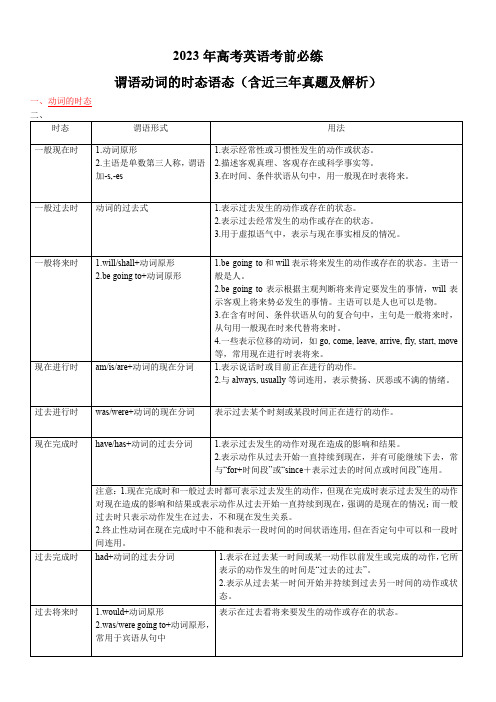
2023年高考英语考前必练谓语动词的时态语态(含近三年真题及解析)一、动词的时态特殊用法1.在时间、条件和让步状语从句中,如果主句谓语动词是一般将来时,从句用一般现在时。
如:We’ll have a picnic if it is fine next Sunday.如果下个星期日天气晴朗,我们将去野餐。
I’ll call you as soon as I get to Beijing tomorrow.我明天一到北京就给你打电话。
2.某些表示起始、往返、出发、到达之意的动词,可用一般现在时表示按规定、计划或安排将要发生的动作(此时一般都有一个表示未来时间的状语)。
这类动词有:begin, come, go, leave, start, arrive, end, stop, open, close等。
如:The meeting begins at 2:00 p.m. tomorrow.这个会议明天下午2点开始。
The next train leaves at 7 o’clock this evening.下一列火车将在今晚7点离开。
3.现在进行时与always, continually, forever等副词连用,表示反复出现或习惯性的动作,这种用法往往表达说话人的某种感情,如赞扬、遗憾、讨厌或不满等。
如:The rich woman is always laughing at the poor.这个有钱的夫人总是嘲笑穷人。
4.现在完成时中表示短暂动作的动词不能与for, since等引导的时间状语连用。
如与一段时间连用,要把瞬间动词转化为意思相近的延续性动词。
常见的变化有:特殊用法1.open,lock,write,read,sell,clean,wash,cut,drive等词作不及物动词时,它们的主语为物,可用主动语态表示被动意义。
如:This kind of pen writes very smoothly.这种钢笔写起来很流畅。
高考英语三大从句(名词性从句、定语从句、状语从句)讲解+练习(附答案)
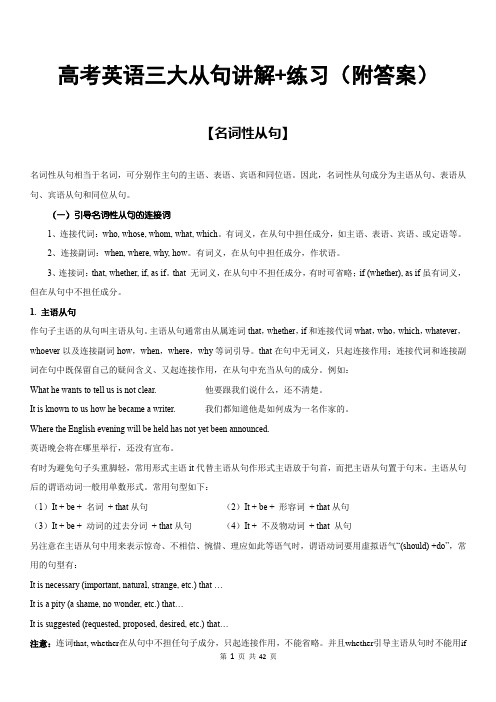
高考英语三大从句讲解+练习(附答案)【名词性从句】名词性从句相当于名词,可分别作主句的主语、表语、宾语和同位语。
因此,名词性从句成分为主语从句、表语从句、宾语从句和同位从句。
(一)引导名词性从句的连接词1、连接代词:who, whose, whom, what, which。
有词义,在从句中担任成分,如主语、表语、宾语、或定语等。
2、连接副词:when, where, why, how。
有词义,在从句中担任成分,作状语。
3、连接词:that, whether, if, as if。
that 无词义,在从句中不担任成分,有时可省略;if (whether), as if虽有词义,但在从句中不担任成分。
1. 主语从句作句子主语的从句叫主语从句。
主语从句通常由从属连词that,whether,if和连接代词what,who,which,whatever,whoever以及连接副词how,when,where,why等词引导。
that在句中无词义,只起连接作用;连接代词和连接副词在句中既保留自己的疑问含义、又起连接作用,在从句中充当从句的成分。
例如:What he wants to tell us is not clear. 他要跟我们说什么,还不清楚。
It is known to us how he became a writer. 我们都知道他是如何成为一名作家的。
Where the English evening will be held has not yet been announced.英语晚会将在哪里举行,还没有宣布。
有时为避免句子头重脚轻,常用形式主语it代替主语从句作形式主语放于句首,而把主语从句置于句末。
主语从句后的谓语动词一般用单数形式。
常用句型如下:(1)It + be + 名词+ that从句(2)It + be + 形容词+ that从句(3)It + be + 动词的过去分词+ that从句(4)It + 不及物动词+ that 从句另注意在主语从句中用来表示惊奇、不相信、惋惜、理应如此等语气时,谓语动词要用虚拟语气“(should) +do”,常用的句型有:It is necessary (important, natural, strange, etc.) that …It is a pity (a shame, no wonder, etc.) that…It is suggested (requested, proposed, desired, etc.) that…注意:连词that, whether在从句中不担任句子成分,只起连接作用,不能省略。
高考英语动词时态语态复习题附答案完整版.doc

(一)动词的时态时态动词是谓语动所表示的动作或情况发生时间的各种形式。
英语动词有16种时态,但是常用的只有9种:一般现在时、一般过去时、一般将来时、现在进行时、过去进行时、现在完成时、过去完成时、过去将来时、现在完成进行时。
下面分别介绍。
1、一般现在时的用法(do/does)1)表示经常性、习惯性的动作;表示现在的状态、特征和真理。
句中常用often, usually, every day, sometimes, every week/year, twice aweek 等时间状语。
例如:a. He goes to school every day.b. He is very happy.c.The earth moves around the sun.2) 在时间状语从句和条件状语从句中,用一般现在时表示将来。
例如:a. If you come this afternoon, we’ll have a meeting.b. When I graduate, I’ll go to countryside.3) 有时这个时态表示按计划、规定, 按时间表要发生的动作(句中都带有时间状语),但限于少数动词,如:begin, come, leave, go ,arrive, start , stop, return, open, close等。
例如:a.the meeting begins at seven.b.the rain starts at nine in the morning.4) 表示状态和感觉的动词(be, like, hate, think, remember, find, sound 等)常用一般现在进行时。
a.i like english very much.b.the story sound very interesting.5) 书报的标题、小说等情节介绍常用一般现在时。
2.一般过去时的用法(did)1)表示过去某时间发生的事、存在的状态或过反复发生的动作。
高考英语语法——_状语从句习题及讲解
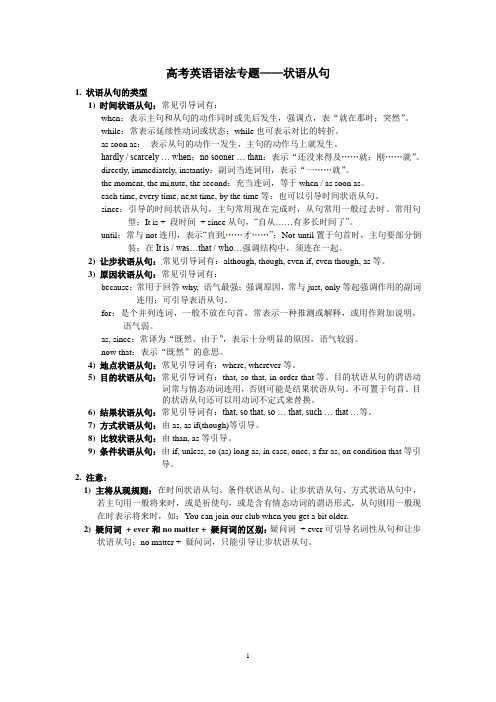
高考英语语法专题——状语从句1. 状语从句的类型1) 时间状语从句:常见引导词有:when:表示主句和从句的动作同时或先后发生,强调点,表“就在那时;突然”。
while:常表示延续性动词或状态;while也可表示对比的转折。
as soon as:表示从句的动作一发生,主句的动作马上就发生。
hardly / scarcely … when;no sooner … than:表示“还没来得及……就;刚……就”。
directly, immediately, instantly:副词当连词用,表示“一……就”。
the moment, the minute, the second:充当连词,等于when / as soon as。
each time, every time, next time, by the time等:也可以引导时间状语从句。
since:引导的时间状语从句,主句常用现在完成时,从句常用一般过去时。
常用句型:It is + 段时间+ since从句,“自从……有多长时间了”。
until:常与not连用,表示“直到……才……”;Not until置于句首时,主句要部分倒装;在It is / was…that / who…强调结构中,须连在一起。
2) 让步状语从句:常见引导词有:although, though, even if, even though, as等。
3) 原因状语从句:常见引导词有:because:常用于回答why, 语气最强;强调原因,常与just, only等起强调作用的副词连用;可引导表语从句。
for:是个并列连词,一般不放在句首,常表示一种推测或解释,或用作附加说明,语气弱。
as, since:常译为“既然、由于”,表示十分明显的原因,语气较弱。
now that:表示“既然”的意思。
4) 地点状语从句:常见引导词有:where, wherever等。
5) 目的状语从句:常见引导词有:that, so that, in order that等。
高中英语状语从句讲解及练习精编版

高中英语状语从句讲解及练习公司内部编号:(GOOD-TMMT-MMUT-UUPTY-UUYY-DTTI-状语从句状语从句在句中作状语,可分为:时间、条件、让步、原因、目的、结果、比较、地点、方式状语从句。
一、时间状语从句引导时间状语从句的连词有:when, as, while, until, not…until, before, after, since, the minute, the moment, each( every, next, the first) time等。
时间状语从句中一般用一般现在时或一般过去时。
1.When , while, as都可解释为“当```的时候”但侧重点有所不同。
1)WhenEg: When I arrived home , I had a little rest.注意点:when 从句的主语与主句主语相同,谓语动词是be 动词时,从句主语和be可以省略。
Eg: When (she was) walking along the street, she met her class teacher.2)AsAs 除了表示“当```的时候”,还可表示为“一面```一面”,“随着”Eg: He sang as he danced.(一面```一面)You will grow wiser as you grow older.(随着)3)While表示“当```的时候”强调主句的动作和从句的动作同时发生,从句一般用进行时,从句动词必须是延续性动词。
Eg: While we were working, they were having a rest.While (they were) having a discussion, they got very confused.注意点:while 有对比的含义,解释为“然而”。
eg: I prefer black tee, while he likes coffee.2.until, not…until表示“直到```才”,在肯定句中主句常用延续性动词;在否定句中主句常用短暂性动词。
高考英语动词的时态和语态专题练习

高考英语动词的时态和语态专题练习高考英语动词的时态介词和语态专题练习高中英语语法(时态和语态) 一.动词的时态时态是谓语动词所表示的动作或情况发生时间的各种形式。
英语动词有16种时态,但是引人注目的只有九种:一般现在时、一般过去时、一般将来时、现在进行时、过去进行时、现在完成时、过去完成时、过去将来时、现在完成进行时。
(一)一般现在时(do / does) 1.具体用法 1) 表示经常性或习惯性动作 We always care for each other and help each other. 我们总是共同进步互相关心互相帮助。
He goes to school every day. 2)表示现在的特征或状态 He is very happy. Do you sing? ----A little. 3)表示普遍真理 Light travels faster than sound. 光速比声速快。
Actions speak louder than words. 行动胜过言语。
* 常与一般现在时态连用的词或短语主要有:often, usually, sometimes, every day, every morning/afternoon, onSundays/weekends等等。
I often go to the cinema on Sundays. 我经常星期天去看电影。
He goes to work early every day. 他每天上班很早。
(二)一般过去时( did ) (1)表示过去路程某一特定时间所频发的、可完成的动作或状态,也常与表示确切过去时间延迟时间的词、短语或从句连用。
例如:We went to the pictures last night and saw a very interesting film. (2)表示过去习惯性动作。
例如:He always went to class last. I used to do my homework in the library. (三)一般将来时( will / shall do) 1)表示将来打算进行或期待的动作或状态。
英语状语从句及其详解 和动词的时态问题
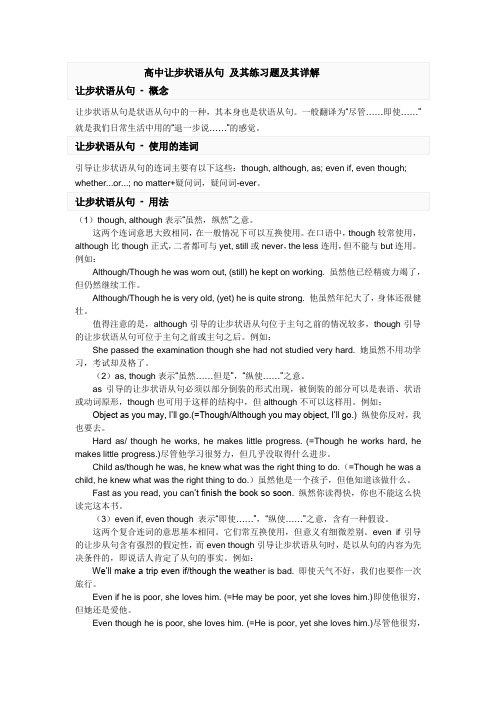
让步状语从句是状语从句中的一种,其本身也是状语从句。
一般翻译为“尽管……即使……”引导让步状语从句的连词主要有以下这些:though, although, as; even if, even though;(1)though, although表示“虽然,纵然”之意。
这两个连词意思大致相同,在一般情况下可以互换使用。
在口语中,though较常使用,although比though正式,二者都可与yet, still或never,the less连用,但不能与but连用。
例如:Although/Though he was worn out, (still) he kept on working. 虽然他已经精疲力竭了,但仍然继续工作。
Although/Though he is very old, (yet) he is quite strong. 他虽然年纪大了,身体还很健壮。
值得注意的是,although引导的让步状语从句位于主句之前的情况较多,though引导的让步状语从句可位于主句之前或主句之后。
例如:She passed the examination though she had not studied very hard. 她虽然不用功学习,考试却及格了。
(2)as, though表示“虽然……但是”,“纵使……”之意。
as引导的让步状语从句必须以部分倒装的形式出现,被倒装的部分可以是表语、状语或动词原形,though也可用于这样的结构中,但although不可以这样用。
例如:Object as you may, I’ll go.(=Though/Although you may object, I’ll go.) 纵使你反对,我也要去。
Hard as/ though he works, he makes little progress. (=Though he works hard, he makes little progress.)尽管他学习很努力,但几乎没取得什么进步。
高考英语_状语从句_详解习题加答案
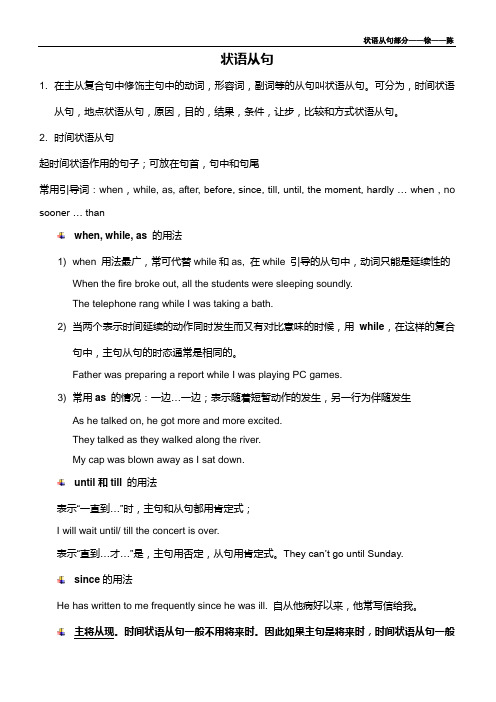
状语从句1. 在主从复合句中修饰主句中的动词,形容词,副词等的从句叫状语从句。
可分为,时间状语从句,地点状语从句,原因,目的,结果,条件,让步,比较和方式状语从句。
2. 时间状语从句起时间状语作用的句子;可放在句首,句中和句尾常用引导词:when,while, as, after, before, since, till, until, the moment, hardly … when , no sooner … thanwhen, while, as的用法1) when 用法最广,常可代替while和as, 在while 引导的从句中,动词只能是延续性的When the fire broke out, all the students were sleeping soundly.The telephone rang while I was taking a bath.2) 当两个表示时间延续的动作同时发生而又有对比意味的时候,用while,在这样的复合句中,主句从句的时态通常是相同的。
Father was preparing a report while I was playing PC games.3) 常用as的情况:一边…一边;表示随着短暂动作的发生,另一行为伴随发生As he talked on, he got more and more excited.They talked as they walked along the river.My cap was blown away as I sat down.until和till的用法表示“一直到…”时,主句和从句都用肯定式;I will wait until/ till the concert is over.表示“直到…才…”是,主句用否定,从句用肯定式。
They can’t go until Sunday.since的用法He has written to me frequently since he was ill. 自从他病好以来,他常写信给我。
高中英语状语从句讲解和练习(含答案)
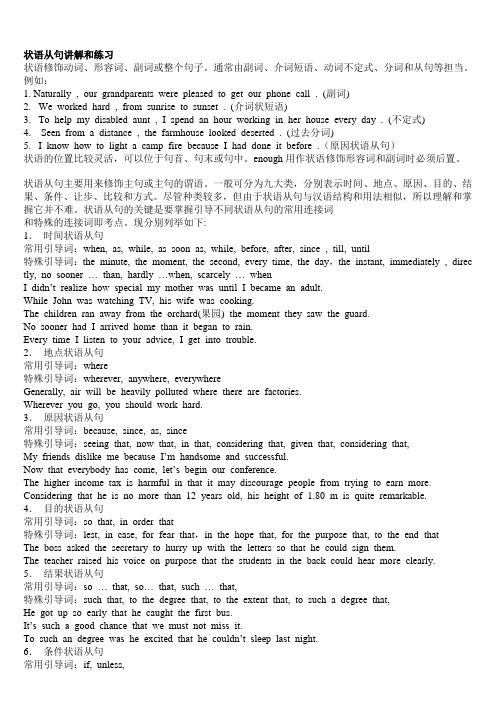
状语从句讲解和练习状语修饰动词、形容词、副词或整个句子。
通常由副词、介词短语、动词不定式、分词和从句等担当。
例如:1. Naturally , our grandparents were pleased to get our phone call . (副词)2. We worked hard , from sunrise to sunset . (介词状短语)3. To help my disabled aunt , I spend an hour working in her house every day . (不定式)4. Seen from a distance , the farmhouse looked deserted . (过去分词)5. I know how to light a camp fire because I had done it before .(原因状语从句)状语的位置比较灵活,可以位于句首、句末或句中。
enough用作状语修饰形容词和副词时必须后置。
状语从句主要用来修饰主句或主句的谓语。
一般可分为九大类,分别表示时间、地点、原因、目的、结果、条件、让步、比较和方式。
尽管种类较多,但由于状语从句与汉语结构和用法相似,所以理解和掌握它并不难。
状语从句的关键是要掌握引导不同状语从句的常用连接词和特殊的连接词即考点。
现分别列举如下:1.时间状语从句常用引导词:when, as, while, as soon as, while, before, after, since , till, until特殊引导词:the minute, the moment, the second, every time, the day,the instant, immediately , direc tly, no sooner … than, hardly …when, scarcely … whenI didn’t realize how special my mother was until I became an adult.While John was watching TV, his wife was cooking.The children ran away from the orchard(果园) the moment they saw the guard.No sooner had I arrived home than it began to rain.Every time I listen to your advice, I get into trouble.2.地点状语从句常用引导词:where特殊引导词:wherever, anywhere, everywhereGenerally, air will be heavily polluted where there are factories.Wherever you go, you should work hard.3.原因状语从句常用引导词:because, since, as, since特殊引导词:seeing that, now that, in that, considering that, given that, considering that,My friends dislike me because I’m handsome and successful.Now that everybody has come, let’s begin our conference.The higher income tax is harmful in that it may discourage people from trying to earn more. Considering that he is no more than 12 years old, his height of 1.80 m is quite remarkable.4.目的状语从句常用引导词:so that, in order that特殊引导词:lest, in case, for fear that,in the hope that, for the purpose that, to the end thatThe boss asked the secretary to hurry up with the letters so that he could sign them.The teacher raised his voice on purpose that the students in the back could hear more clearly.5.结果状语从句常用引导词:so … that, so… that, such … that,特殊引导词:such that, to the degree that, to the extent that, to such a degree that,He got up so early that he caught the first bus.It’s such a good chance that we must not miss it.To such an degr ee was he excited that he couldn’t sleep last night.6.条件状语从句常用引导词:if, unless,特殊引导词:as/so long as, only if, providing/provided that, suppose that, in case that, on condition th atWe’ll start our project if the president agrees.You will certainly succeed so long as you keep on trying.Provided that there is no opposition, we shall hold the meeting here.7.让步状语从句常用引导词:though, although, even if, even though特殊引导词:as(用在让步状语从句中必须要倒装),while ( 一般用在句首),no matter …,in spite of the fact that, while, whatever, whoever, wherever, whenever, however, whicheverMuch as I respect him, I can’t agree to his proposal.尽管我很尊敬他,我却不同意他的建议。
状语从句及练习附答案

状语从句(adverbial clause)复习要点:掌握句法功能,记住连接词语法意义:状语从句是复合句中的一种,整个从句作主句的状语,修饰主句中的谓语动词、形容词、或副词。
置于句首时,状语从句后面一般要有逗号隔开;如果状语从句置于句尾,则从句一般不用逗号。
按照所作的状语和意义可分为时间、地点、原因、目的、结果、条件、让步、方式和比较等九种状语从句。
具体如下:一、时间状语从句(Adverbial Clauses of Time)时间状语从句通常由when,whenever,as,while,before,after,assoon as,since,once,no sooner...then,hardly/scarcely...when,tiLl/until 以及the moment,directly,immediately,the second,thefirst time,next time,every time,等引导。
1.由when,as,while 引导的状语从句:1)when 引导时间状语从句,表示当···,其谓语动词可以是延续性的,也可以是非延续性的,其作用最广泛。
When spring comes,trees turn green,When it rains,I usually go to work by taxi.When we were having lunch,the light went out.I will ring you up when I return.When she pressed the button,the lift stopped.He was eating his breakfast when the doorbell rang.be about to do...when...“就在那/这时,(突然)另一个动作发生了,在这儿只能用when。
高考英语专项复习《动词的时态、语态、情态动词、虚拟语气》真题总结含答案
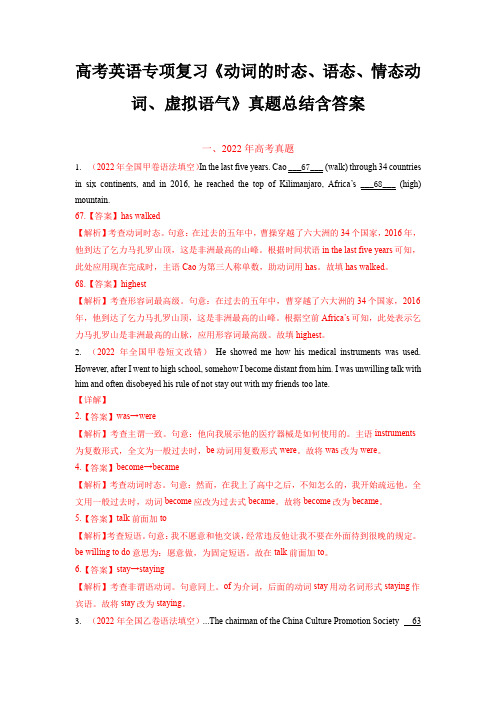
高考英语专项复习《动词的时态、语态、情态动词、虚拟语气》真题总结含答案一、2022年高考真题1.(2022年全国甲卷语法填空)In the last five years. Cao ___67___ (walk) through 34 countries in six continents, and in 2016, he reached the top of Kilimanjaro, Africa’s ___68___(high) mountain.67.【答案】has walked【解析】考查动词时态。
句意:在过去的五年中,曹操穿越了六大洲的34个国家,2016年,他到达了乞力马扎罗山顶,这是非洲最高的山峰。
根据时间状语in the last five years可知,此处应用现在完成时,主语Cao为第三人称单数,助动词用has。
故填has walked。
68.【答案】highest【解析】考查形容词最高级。
句意:在过去的五年中,曹穿越了六大洲的34个国家,2016年,他到达了乞力马扎罗山顶,这是非洲最高的山峰。
根据空前Africa’s可知,此处表示乞力马扎罗山是非洲最高的山脉,应用形容词最高级。
故填highest。
2.(2022年全国甲卷短文改错)He showed me how his medical instruments was used. However, after I went to high school, somehow I become distant from him. I was unwilling talk with him and often disobeyed his rule of not stay out with my friends too late.【详解】2.【答案】was→were【解析】考查主谓一致。
句意:他向我展示他的医疗器械是如何使用的。
主语instruments 为复数形式,全文为一般过去时,be动词用复数形式were。
高考英语状语从句和动词时态详解及练习
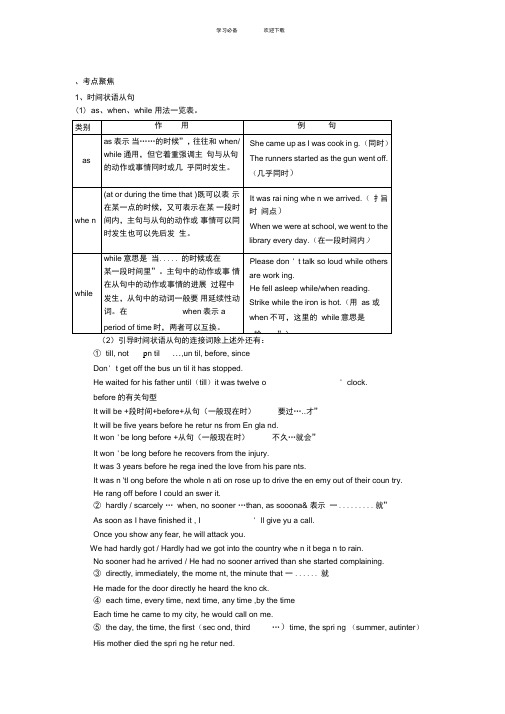
、考点聚焦1、时间状语从句(1) as、when、while 用法一览表。
(2)引导时间状语从句的连接词除上述外还有:①till, not p n til …,un til, before, sinceDon' t get off the bus un til it has stopped.He waited for his father until(till)it was twelve o ' clock.before的有关句型It will be +段时间+before+从句(一般现在时)要过…..才”It will be five years before he retur ns from En gla nd.It won 'be long before +从句(一般现在时)不久…就会”It won 'be long before he recovers from the injury.It was 3 years before he rega ined the love from his pare nts.It was n 'tl ong before the whole n ati on rose up to drive the en emy out of their coun try.He rang off before I could an swer it.②hardly / scarcely … when, no sooner …than, as sooona& 表示一......... 就”As soon as I have finished it , I ' ll give yu a call.Once you show any fear, he will attack you.We had hardly got / Hardly had we got into the country whe n it bega n to rain.No sooner had he arrived / He had no sooner arrived than she started complaining.③directly, immediately, the mome nt, the minute that 一...... 就He made for the door directly he heard the kno ck.④each time, every time, next time, any time ,by the timeEach time he came to my city, he would call on me.⑤the day, the time, the first(sec ond, third …)time, the spri ng (summer, autinter)His mother died the spri ng he retur ned.注意:表示未来情况,主句用将来时,从句用现在时。
(完整版)状语从句练习

(完整版)状语从句练习状语从句状语从句:指把一句子当着副词作状语时,修饰动词、或整个句子;根据它在句中的作用可分为时间、地点、原因、条件、目的、结果、让步、方式和比较等从句;状语从句前一般由连词(从属连词)引导,也可以由词组引导。
它常位于句首;若位于句中,常用逗号与主句隔开;位于句尾时可以不用逗号隔开。
一、时间状语从句1. 通常由以下连词弓丨导:when / while / as/ after/ before/ as soon as/ since/ till /until / by the time2. 在时间状语从句中,要注意时态一致。
(主将从现)1).when 当…..的时候: Mozart started writing music when he was four years old.2).while 在…期间: He visited a lot of places while he was traveling.3).as 在…的同时;一边…一边...: He smiled as he stood up.4).after 在...之后: He left the classroom after he had finished his homework the other day.5).before 在...之前Mr. brown had worked in a bank for a year before he came here.6).as soon as 一...就... We bega n to work as soon as we got there. I will write to you as soon as i get home.7).since 自...以来(至U现在) Mr green has taught in that school since he came to china three years ago.8)till /until 直至U : They walked till /until it was dark. Tom didn ' t leave home till / until his father came back.难点---- as/ when/ while的辨析as when while都表示主、从句动作同时发生,三者差异如下:as表示一边…一边"/随着,强调两个动作同时进行,I am cooking as I am singing.when 当…..的时候,从句动作可在主句动作"之前"或"之后"发生lit was raining hard when (as) i got there. 还可表and then; at that moment (正在那个时候/突然):I am leaving for Beijing when the phone rang.while 在…期间从句动作为延续性动词或状态词I am cooki ng while I am si ngi ng然而((表转折,对比)she thought I was talking about her daughter, while I was talking about my daughter.Mother was worried because little Alice was ill, especially as (when/ while) father was away.二、条件状语从句要点:状语从句由连词if (如果)、unless (=if not)(除非)弓I导。
(word完整版)高考必考动词时态练习及参考答案(2021年整理)
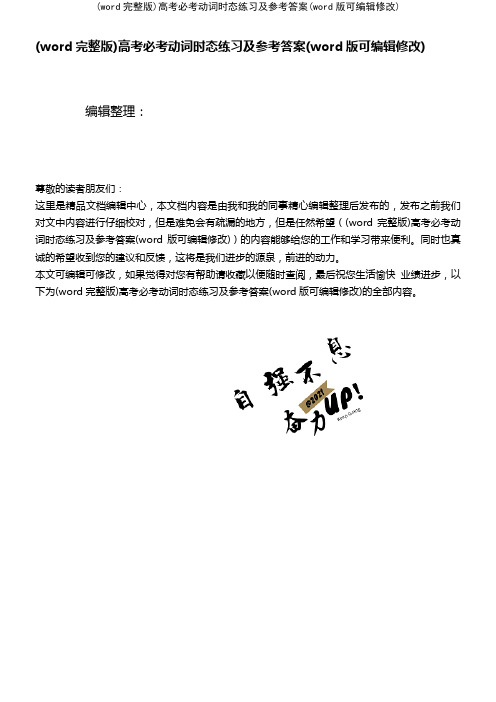
(word完整版)高考必考动词时态练习及参考答案(word版可编辑修改) 编辑整理:尊敬的读者朋友们:这里是精品文档编辑中心,本文档内容是由我和我的同事精心编辑整理后发布的,发布之前我们对文中内容进行仔细校对,但是难免会有疏漏的地方,但是任然希望((word完整版)高考必考动词时态练习及参考答案(word版可编辑修改))的内容能够给您的工作和学习带来便利。
同时也真诚的希望收到您的建议和反馈,这将是我们进步的源泉,前进的动力。
本文可编辑可修改,如果觉得对您有帮助请收藏以便随时查阅,最后祝您生活愉快业绩进步,以下为(word完整版)高考必考动词时态练习及参考答案(word版可编辑修改)的全部内容。
1。
My mind wasn’t on what he was saying so I’ m afraid I ______ half of it。
A. was missingB. had missed C。
will miss D。
missed(04浙江卷)2。
The discussion ____ alive when an interesting topic was brought in. A。
was coming B。
had come C。
has comeD. came(04福建卷)3。
She has set a new record ,that is ,the sales of her latest book ________ 50 million。
A.have reached B.has reached C.are reaching D.had reached(04江苏卷)4. More patients ___________ in hospital this year than last year.A. treatedB. have treated C。
had been treated D. have been treated(04湖北卷)5. He kept looking at her , wondering whether he her somewhere 。
3.最新版高考英语语法——状语从句详解讲义和习题
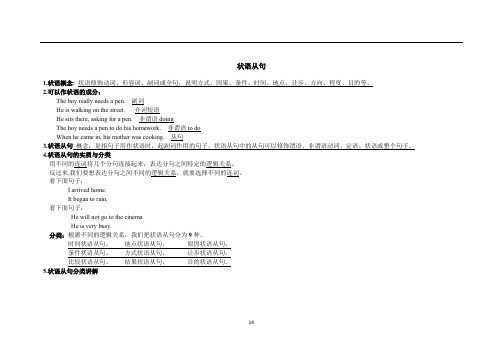
状语从句1.状语概念: 状语修饰动词、形容词、副词或全句,说明方式、因果、条件、时间、地点、让步、方向、程度、目的等。
2.可以作状语的成分:The boy really needs a pen. 副词He is walking on the street. 介词短语He sits there, asking for a pen. 非谓语doingThe boy needs a pen to do his homework. 非谓语to doWhen he came in,his mother was cooking. 从句3.状语从句概念:是指句子用作状语时,起副词作用的句子。
状语从句中的从句可以修饰谓语、非谓语动词、定语、状语或整个句子。
4.状语从句的实质与分类用不同的连词将几个分句连接起来,表达分句之间特定的逻辑关系。
反过来,我们要想表达分句之间不同的逻辑关系,就要选择不同的连词。
看下面句子:I arrived home.It began to rain.看下面句子:He will not go to the cinemaHe is very busy.分类:根据不同的逻辑关系,我们把状语从句分为9种。
时间状语从句,地点状语从句,原因状语从句,条件状语从句,方式状语从句,让步状语从句,比较状语从句,结果状语从句,目的状语从句。
5.状语从句分类讲解141414141414141414【时间状语从句精练】1.As is reported, it is 100 years ________Qinghua University was founded.A. whenB. beforeC. afterD. Since2. He had no sooner finished his speech the students started cheering.A. sinceB. asC. whenD. than3. One Friday, we were packing to leave for a weekend away__my daughter heard cries for help.A. afterB. whileC. sinceD. when4. Mary made coffee ________ her guests were finishing their meal.A.so that B although C. while D. as if5.John thinks it won’t be long he is ready for his new job.A. whenB. afterC. beforeD. since6. You can’t borrow books from the school library __ you get your student card.A.beforeB. ifC. whileD. as7.Peter was so excited he received invitation from his friend to visit Chongqing.A. whereB. thatC. whyD. when8. The field research will take Joan and Paul about five months; it will be a long time ____ we meet them again.A. afterB. beforeC. sinceD. when 【条件状语从句精练】1.I won’t call you, ________ something unexpected happens.A. unlessB. whetherC. becauseD. while2.______ he had not hurt his leg, John would have won the race.A. IfB. SinceC. ThoughD. When3.You will be successful in the interview you have confidence.A. beforeB. onceC. untilD. though4.He had his camera ready __he saw something that would make a good picture.A. even ifB. if onlyC. in caseD. so that5. My parents don’t mind what job I do I am happy.A. even thoughB. as soon asC. as long asD. as though6.We’ll have a picnic in the park this Sunday _____ it rains or it’s very cold.A. sinceB. ifC. unlessD. until7.you’ve tried it,you can’t imagine how pleasant it is.A. UnlessB. BecauseC. AlthoughD. When【让步状语从句精练】1._______this is only a small town,it's crowded with tourists who come here allyear round.A.SinceB.UnlessC.OnceD.Although2.Allow children the space to voice their opinionsthey are different from your own.A.untilB.even ifC.unlessD.as though3._________,Carolina couldn’t get the door open.A.Try as she mightB.As she might tryC.She might as tryD.Might she as try4.___he has limited technical knowledge,the old worker has a lot of experience.A.SinceB.unlessC.AsD.Although5.______the Internet is of great help,I don’t think it’s a good idea to spend toomuch time on it.A.IfB.WhileC.BecauseD.As6.There was never any time for Kate to feel lonely,____she was an only child.A.ever sinceB.now thatC.even thoughD.even as7.________I really don’t like art,I find his work impressive.A.As B.Since C.If D.While8.All people,______they are old or young,rich or poor,have been trying theirbest to help those in need since the disaster.14A.even ifB.whetherC.no matterD.however9. —Dad,I’ve finished my assignment.—Good,and________you play or watch TV,you mustn't disturb me.A.wheneverB.whetherC.whateverD.no matter【原因状语从句精练】1.you’ve got a chance,you might as well make full use of it.A.Now thatB.AfterC.AlthoughD.As soon as2.He found it increasingly difficult to read,his eyesight was beginning to fail.A.andB.forC.butD.or3.A man cannot smile like a child,____a child smiles with his eyes,while a ma n smiles with his lips alone.A.soB.butC.andD.for4.—Coach,can I continue with the training?—Sorry,you can't________you haven't recovered from the knee injury.A.untilB.beforeC.asD.unless5.—Did you return Fred’s call?—I didn’t need to I’ll see him tomorrow.A. thoughB. unlessC. whenD. because【地点状语从句精练】1.—Mom,what did the doctor say?—He advised me to live the air is fresher.A.in whereB.in whichC.the place whereD.where2.In peace,too,the Red Cross is expected to send help there is humansuffering.A.whoeverB.howeverC.whateverD.wherever【结果状语从句精练】1.Pop music is such an important part of society_______it has even influenceour language.A.asB.thatC.whichD.where2.His plan was such a good one we all agreed to accept it.A.soB.andC.thatD.as3.We were in when we left that we forgot the airline tickets.A.a rush so anxiousB.a such anxious rushC.so an anxious rushD.such an anxious rush【目的状语从句精练】1.The police officers in our city work hard _ the rest of us can live a safe life.A. in caseB. as ifC. in order thatD. only if2. I’d like to arrive 20 minutes early I can have time for a cup of tea.A.as soon asB.as a resultC.in caseD.so that3. Roses need special care____they can live through winter.A.becauseB.so thatC.even ifD.as4.Leave your key with a neighbor you lock yourself out one day.A.ever sinceB.even ifC.soon afterD.in case5.I shall stay in the hotel all day there is news of the missing child.A.in caseB.no matterC.in any caseD. ever since14。
(完整版)高中英语状语从句讲解及练习
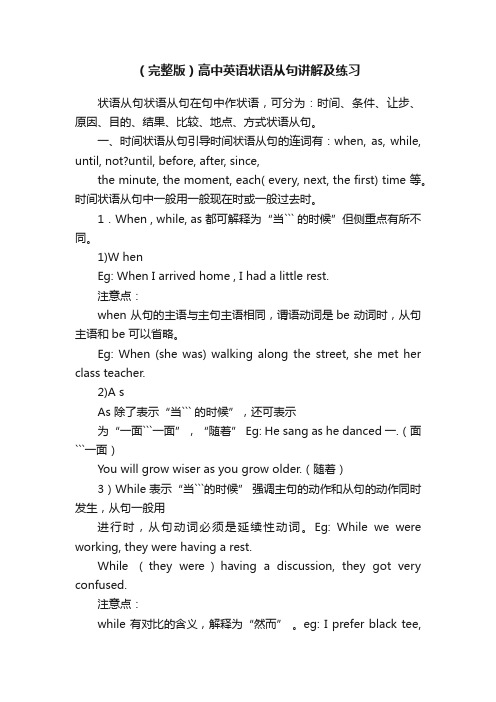
(完整版)高中英语状语从句讲解及练习状语从句状语从句在句中作状语,可分为:时间、条件、让步、原因、目的、结果、比较、地点、方式状语从句。
一、时间状语从句引导时间状语从句的连词有:when, as, while, until, not?until, before, after, since,the minute, the moment, each( every, next, the first) time 等。
时间状语从句中一般用一般现在时或一般过去时。
1.When , while, as 都可解释为“当``` 的时候”但侧重点有所不同。
1)W henEg: When I arrived home , I had a little rest.注意点:when 从句的主语与主句主语相同,谓语动词是be 动词时,从句主语和be 可以省略。
Eg: When (she was) walking along the street, she met her class teacher.2)A sAs 除了表示“当``` 的时候”,还可表示为“一面```一面”,“随着” Eg: He sang as he danced一.(面```一面)You will grow wiser as you grow older.(随着)3)While 表示“当```的时候” 强调主句的动作和从句的动作同时发生,从句一般用进行时,从句动词必须是延续性动词。
Eg: While we were working, they were having a rest.While (they were)having a discussion, they got very confused.注意点:while 有对比的含义,解释为“然而” 。
eg: I prefer black tee,while he likes coffee. 2.until, not ?until 表示“直到```才” , 在肯定句中主句常用延续性动词;在否定句中主句常用短暂性动词。
- 1、下载文档前请自行甄别文档内容的完整性,平台不提供额外的编辑、内容补充、找答案等附加服务。
- 2、"仅部分预览"的文档,不可在线预览部分如存在完整性等问题,可反馈申请退款(可完整预览的文档不适用该条件!)。
- 3、如文档侵犯您的权益,请联系客服反馈,我们会尽快为您处理(人工客服工作时间:9:00-18:30)。
一、考点聚焦1、时间状语从句(2)引导时间状语从句的连接词除上述外还有:①till, not … until …, until, before, sinceDon’t get off the bus until it has stopped.He waited for his father until(till)it was twelve o’clock.before 的有关句型It will be +段时间+before+从句(一般现在时)“要过…..才”It will be five years before he returns from England.It won’t be long before +从句(一般现在时)“不久…就会”It won’t be long before he recovers from the injury.It was 3 years before he regained the love from his parents.It wasn’t long before the whole nation rose up to drive the enemy out of their country.He rang off before I could answer it.②hardly / scarcely … when, no sooner … than, as soon as once表示“一……就”As soon as I have finished it , I’ll give yu a call.Once you show any fear, he will attack you.We had hardly got / Hardly had we got into the country when it began to rain.No sooner had he arrived / He had no sooner arrived than she started complaining.③directly, immediately, the moment, the minute that… 一……就He made for the door directly he heard the knock.④each time, every time, next time, any time ,by the timeEach time he came to my city, he would call on me.⑤the day, the time, the first(second, third …)time, the spring (summer, autumn, winter)His mother died the spring he returned.注意:表示未来情况,主句用将来时,从句用现在时。
在时间和条件从句中,主句是一般将来时,从句通常用一般现在时表示一般将来或者用现在完成表示将来完成。
e.g. We’ll go outing if it doesn’t rain tomorrow.I’ll write to you as soon as I get to Shanghai.Don’t get off the bus until the bus has stopped .2、让步状语从句(1)although与though可以引导让步状语从句,不能与but连用,但可以与yet连用。
Although they are poor,(yet)they are warm-hearted.(2)even if或even though引导让步状语从句,表示“即使”,“纵然”,用来使人注意下文所强调内容的性质。
I’ll get there even if(though)I have to sell my house to get enough money to go by air.(3)no matter后接上who、what、where、how等疑问词,也可以在这类疑问词后面加上ever构成whoever、whatever、wherever、however等。
Don’t trust him, no matter what / whatever he says.Whoever breaks the law will be published.No matter how hard the work is, you’d better try to do it well.(4)as也可以引导让步状语从句。
要用倒装。
Child as(though)he is, he knows a lot.Much as I like it, I won’t buy.Try as he would, he couldn’t lift the heavy box.(5)whether…..or(无论……….与否)无论他是否愿意参与这次活动,我们也要坚持直到成功.__________________________________________________________________________3、原因状语从句:because, for, as, since, now that(1)表示不知道的原因时用because,即说话人认为听话人不知道,因此because从句是全句最重要的部分,通常它被置于主句之后。
You want to know why I’m leaving? I’m leaving because I’m full.for虽然表示不知道的原因,但其语气较because要弱得多,是可说可不说的话,它只能置于主句之后,这时,for是并列连词。
如果不是因果关系,而是对前面主句的内容加以解释或推断时,只能用for。
如:It’s morning now, for the birds are singing.(很显然,鸟叫不可能是“现在已是早上”的原因。
)(2)表示已经知道的原因时用as或since,即某种原因在说话人看来已经很明显,或已为听话人所熟悉,因此它是句中不很重要的部分。
since要比as正式一些,它们通常被置于语句之前,但有时却相反。
Seeing all of the children already seated, he said,“Since everyone is here, let’s start.”(3)下列情况下只能使用because:①在回答why的问句时;②在用于强调句型时;③被not所否定时。
4、地点状语从句:where, whereverMake a mark wherever you have any questions.We will go where the Party directs us.5、目的状语从句:so, that, so that, in order that, in case(以防,以免)等.注意:目的状语从句的谓语动词常与情态动词连用,否则可能是结果状语从句。
不可置于句首。
She has bought the book in order that she could follow the TV lessons.He left early in case he should miss the train.6、结果状语从句:that, so that, so … that, such … that …注意:so + 形容词/副词+ that从句;such +名词+ that从句。
7、方式状语从句:as, as if(though)I’ll do as I am told to.It looks as if it is going to rain.8、比较状语从句:than, as, the more … the more9、条件状语从句:if, unless, so (as) long as, in case, once, as far as, on condition that,.注意if与unless的区别:不能用and连接两个unless从句,即不能有… unless …,and unless … 。
但if … not and if … not却不受此限。
You won’t lose your weight unless you eat less and unless you exercise more.(×)You won’t lose your weight unless you eat les s and exercise more.(√)If (he is) not in the office, he must be out for lunch.You may borrow the book so long as you keep it clean.So far as I know(据我所知), he will be away for three months.You can go swimming on condition that you don’t go too far aw ay from the river bank.If he had come a few minutes earlier, he could have seen her.10、注意状语从句中从句的省略现象(1)连接词+ 过去分词Don’t speak until spoken to.Pressure can be increased when needed.Unless repaired, the washing machine is no use.(2)连词+现在分词Look out while crossing the street.(3)连词+ 形容词/其他常见的有it necessary、if possible、when necessary、if any等。
二、精典名题导解选择填空1. I don’t think I’ll need any money but I’ll bring some ____________.(NMET 2000)A.as lastB.in caseC.once againD.in time解析:答案为B。
句意为“带些钱以防万一”,只能选择in case。
引导的条件状语从句,后面省略了I should need it。
2. The WTO can’t live up to its name _________ it doesn’t include a country that is home to one fifth of mankind.(NMET 2000)A.as long asB.whileC.ifD.even though解析:答案为C。
